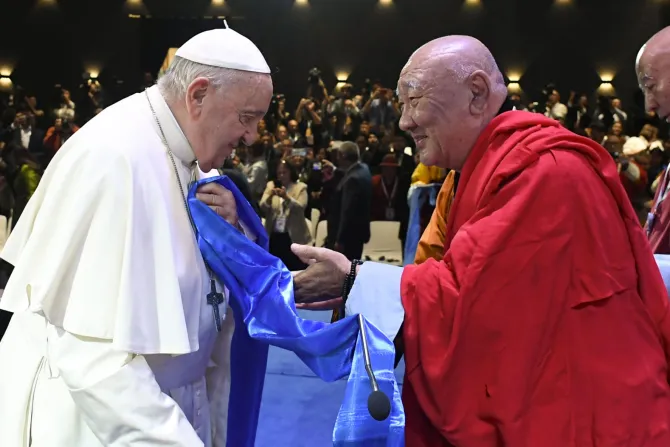In a meeting with Mongolian Buddhists, Shamans, Shintoists, and other religious representatives, Pope Francis said Sunday that interreligious dialogue is “not antithetical to proclamation” but helps religious traditions to understand one another.
“With humility and in the spirit of service … the Church offers the treasure she has received to every person and culture, in a spirit of openness and in respectful consideration of what the other religious traditions have to offer,” Pope Francis said in a speech in Ulaanbaatar’s Hun Theater on Sept. 3.
“Religious traditions, for all their distinctiveness and diversity, have impressive potential for the benefit of society as a whole,” he added.
Pope Francis met with 12 religious leaders and representatives in the performing arts center on the Bogd Khan Uu mountain overlooking Mongolia’s capital city. The theater is built in the circular shape of a traditional Mongolian nomadic yurt dwelling called a “ger.” The rector of the only Orthodox church in Mongolia, Father Antony Gusev, represented the Russian Orthodox Church at the meeting.
In his speech, Pope Francis twice cited the “Dhammapada,” the most widely-read Buddhist text that is a collection of sayings of the Buddha. “The fragrance of flowers spreads only in the direction of the wind, the fragrance of those who live according to virtue spreads in all directions,’” the pope said, quoting the “Dhammapada.”
Nearly 90% of Mongolians who identify as religious are Buddhist. Mongolia is also home to a boy who is considered the 10th reincarnation of Buddha, discovered by the Dalai Lama in 2016. Khamba Nomun Khan, the head of the Gandan Monastery in Ulaanbaatar, accompanied Pope Francis as he made his entrance at the interreligious dialogue event.
The religious landscape of Mongolia — once a heartland of Tibetan Buddhism — was dramatically changed by communist rule. At the turn of the century, there were an estimated 110,000 Buddhist monks and 700 monasteries in Mongolia.
A French Catholic missionary who visited what is today Mongolia at the end of the 19th century saw the succession of Buddhist monasteries in Mongolia and noted that the vast country would also be well-suited for a Catholic contemplative monastery, a dream shared by Cardinal Giorgio Marengo, Mongolia’s apostolic prefect.
Under the Mongolian People’s Republic’s one-party rule, many monasteries were destroyed and closed and about 17,000 Buddhist monks were killed, while many others renounced religious life. While in recent years, the country has had a modest religious revival with a movement to rebuild the destroyed Buddhist monasteries after the fall of the Soviet Union, today roughly 40% of Mongolia’s population remains atheist or without a religion.
“May the memory of past suffering — here I think especially of the Buddhist communities — bestow the strength needed to transform dark wounds into sources of light, senseless violence into the wisdom of life, devastating evil into constructive goodness,” Pope Francis said at the meeting.
Gusev, who represented the Russian Orthodox Church at the event, also recalled the persecution Christians experienced in Mongolia in the 20th century, particularly the torture and murder of Orthodox Father Feodor Parnyakov by Russian Gen. Baron Ungern von Sternberg in 1921. In his speech, Pope Francis quoted another line attributed to the Buddha: “‘The wise man rejoices in giving, and by that alone does he become happy.”
By Courtney Mares



Leave A Comment